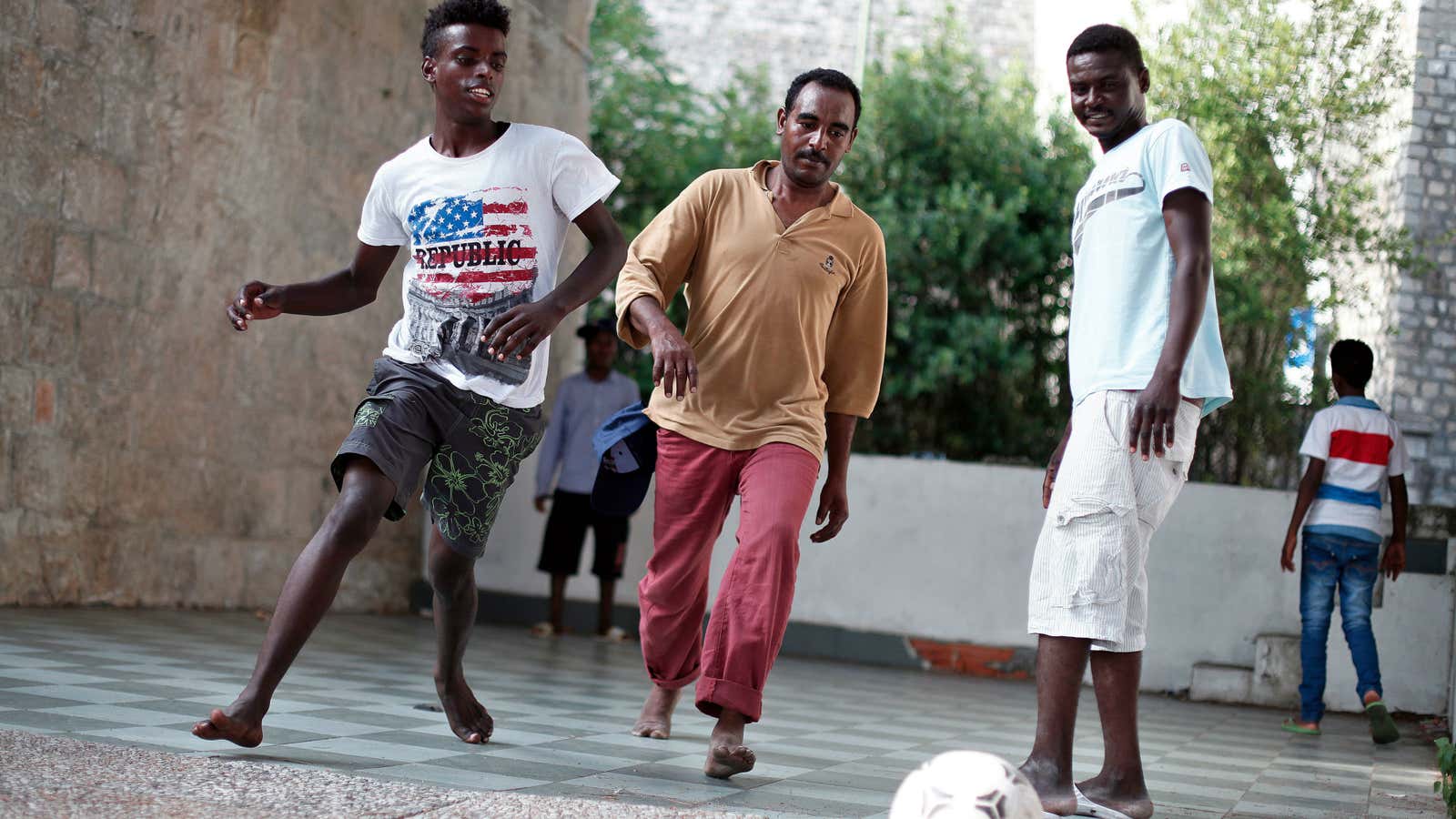With the prevalence of reports documenting the worrying conditions faced by individuals within Eritrea, and the huge numbers leaving the country, one might ask: who remains in the country and why?
Conversations with colleagues and friends within Eritrea last year often turned to people discussing why they had decided not to leave. For many, their rationale was simple: because somebody they knew already had. Those who had left constituted the “lungs” whose remittances kept those within the country alive. The question then is what would happen if that flow dried up.
All of their dependants, whether brothers, sisters, fathers, mothers, children, friends and wider relatives, would have to rethink the feasibility of remaining in Eritrea. Many reasoned that the only solution would be to themselves cross the border and leave their country. The country of 6.7 million is located in the Horn of Africa.
For many reasons, leaving Eritrea is an intimidating prospect. Every stage of the onward journey carries danger, and no certainty of employment. Those who leave Eritrea forfeit their automatic right to return and their rights to assets within the country. It potentially places their relatives and friends at risk of being accused by the government of assisting their escape.
For others, love for their country runs deep and they do not wish to abandon it after its hard-fought struggle for independence. Their desire to stay put is nonetheless linked to the ability of others around them to move.
Beyond the contribution that gold and mining make to the Eritrean economy, the World Bank says that “economic conditions remain challenging”. Government policies have impoverished those surviving in Eritrea without external support. These include:
- indefinite national service;
- restrictions on citizens’ domestic and international movements; and
- reports of harsh punishments for those transgressing some of the state’s more repressive policies.
Many of the those individuals that are stopped from entering Europe, barricaded in camps in Calais, or ping-ponged between European member states on an increasingly frequent basis, are therefore part of complex transnational coping strategies.
Futility of ‘migrant’, ‘refugee’ debate
A distraction from understanding the problems faced by individuals in Europe and at its frontiers right now has been the obsession with how to categorise them. This is done purely according to their status in the immediate “here and now”.
Why people move is always a mixture of voluntary and involuntary factors. The compartmentalisation of people into economic migrants or refugees therefore obscures the fundamental ways in which these two groups are intimately related.
As is so clear in Eritrea, to mitigate against the worst effects of the state and its market, those individuals who can leave become “economic migrants”. What is important is that they do so precisely to protect their families and friends from becoming refugees themselves.
Plans by the EU to reduce the numbers of individuals leaving Eritrea through development aid thus epitomises the inability of policymakers to join up the dots between those leaving the country and those staying behind. Proposals such as these are weak for at least two reasons:
- when it is the violence perpetrated by a state which forces citizens to leave, channelling aid through those very same institutions may well fail to address any of the original problems; and
- a few million pounds of development aid, as was the case in Eritrea, is often nothing compared to the scale of remittances that many states receive through their diaspora.
Role of remittances
Policies that deny people the opportunity to provide financial support to friends and relatives outside of Europe, by seeing “migrants” and “refugees” as discrete groups of individuals, are self-defeating. We should rather support individuals to work in Europe, thus enabling them to send remittances to those who may not wish to undertake that journey themselves.
Allowing certain individuals to stay in Europe for work prevents whole families having to cross militarised borders, board ramshackle boats or pay huge fares to be smuggled in appalling conditions overland. Remittances provide a lifeline, both to individuals who remain within countries that are experiencing high degrees of violence, persecution and state failure, and for those who wish to remain in refugee camps near their country of origin.
Evidence abounds about the importance of remittances and the value of facilitating these global flows of money. The celebration of remittance economies nonetheless seems to have remained detached in the popular media from the broader debates on migration and asylum.
Remittances are not only quantitatively greater, but also qualitatively more effective at assisting local populations and catalysing their development.
Linking the importance of remittances to the debate about whether people are economic migrants or refugees is critical. Images of young women or men sitting on fences at Melilla or boarding trains in Europe often invoke the label “economic migrant”, as if to dismiss the critical importance of their journeys.
On the contrary, and alongside the fact that on too many occasions this label is wrongly applied instead of granting asylum, in certain situations it is entirely because of these “migrants” that other individuals in their families are not forced to become “refugees”.
Allowing people to come, work and send back remittances preempts the need for more people to leave their homes to escape the devastating effects of war, violence and economic collapse. In building fences, bombing boats and blocking borders, however, we undermine these strategies and contribute towards forcing certain people to leave their countries and claim asylum elsewhere.
Regardless of the labels used, it seems naive and counterproductive not to join these debates and movements together.
Georgia Cole, Researcher in the Department of International Development, University of Oxford
This article was originally published on The Conversation. Read the original article.
